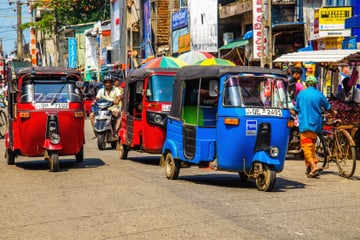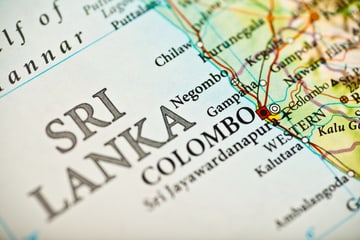"This year contributed greatly to my personal and professional development", Julia Moser
Julia Moser spent one year in Sri Lanka as part of the talent programme "Swiss Youth at the United Nations". She talks us through some of her most memorable moments.

About the talent programme
Each year, the Swiss Government funds around 30 one-year positions within the talent programme, "United Nations Youth Volunteer (UNYV)". This programme allows young professionals to gain valuable field experience while contributing to the Sustainable Development Goals. Swiss nationals, under 29 years old and holding a master’s degree, are eligible for this unique international opportunity.
Learn more
Julia Moser at the time of writing
- Age: 30 years
- Education: M.A. in Migration & Diaspora Studies, SOAS, University of London
- Professional experience: Associate Protection Officer (UNV) with UNHCR Sri Lanka April 2014-2015, previously working for the Swiss Refugee Council in Bern, the British Red Cross and the Council Assisting Refugee Academics in London
What was your motivation to apply for a UN Youth Volunteer position?
The opportunity to gain field experience and to get to know the United Nations High Commissioner for Refugees (UNHCR) and its work «from the inside». I was also particularly attracted to the UN Youth Volunteer position in Sri Lanka, as I had previously done work researching human rights issues in Sri Lanka as well as supporting Tamil refugees both in England and Switzerland. Additionally, I found Colombo to be a very appealing location, a small city on the Indian Ocean with an interesting mix of different religious and ethnic communities.

What did a typical day look like?
A typical day would start waking up early to the sounds of tropical birds, neighbours sweeping, and the «Pour Elise»-melody of a tuktuk selling bread on the street. After making my way to the office through the chaotic rush hour traffic, I would answer some emails and make final preparations for an interview to be conducted with beneficiaries, by reading reports on the situation in the countries of origin and amending my interview questions. The interview might continue in the afternoon, after a quick break to eat some rice and spicy curry from the small office canteen. Typically, I would stay late in the office, editing interview transcripts, writing the assessment reports and discussing my cases with my supervisors. After finally leaving the office, I would go for a driving class or relax by walking home through the leafy streets or meeting friends for dinner.
What were your main tasks?
Six years after the conflict in Sri Lanka officially ended, the work of UNHCR is no longer focused mainly on supporting Tamil people displaced in the North of the country. Instead, UNHCR is increasingly concerned with the rising numbers of asylum seekers arriving from other countries, in particular members of religious minority groups from Afghanistan, Pakistan and Myanmar. Working with these groups of migrants, my main tasks as Associate Protection Officer were to assess various protection needs, determine refugee status and ensure the wellbeing of unaccompanied minors. A few weeks after my arrival, the Sri Lankan immigration authorities began arresting, detaining and deporting significant numbers of these migrants, which created a lot of anxiety in the community and even more urgency in our work.
As a UN Youth Volunteer, what are the biggest challenges you had to face? How did you deal with?
Despite being a UN Youth Volunteer by contractual status, for UNHCR I was officially appointed as Associate Protection Officer, a demanding role usually requiring a background of legal studies and several years of relevant work experience, including in Refugee Status Determination. This presented a unique opportunity to learn and get work experience in such a competitive position. At the same time, it also meant significant challenges as I was expected to «hit the ground running», producing a high case output with very limited induction and supervision. My high passion for the work and persistency in demanding supervisory feedback eventually helped me to achieve the required speed and quality of work, but it was certainly not possible without a lot of determination, a few tears and evenings and weekends brooding over case reports. Beyond the work, living on my own in a tropical environment of course also posed some additional challenges, including staying healthy and quickly establishing a new social network.
It was a unique opportunity to learn and get work experience, while facing significant challenges.
Can you describe your most striking experience during this year in the field?
Every time I engaged with vulnerable beneficiaries and felt that my presence made them a bit more hopeful or at ease with their situation felt like a huge success. To me, there is nothing more humbling than being told about traumatic experiences by the most vulnerable, such as women who experienced sexual and gender based violence or unaccompanied minors who left their families and travelled to Sri Lanka on their own, for example Rohingya boys who left on a boat from Myanmar and were found floating without petrol on high sea. My happiest moment was probably when the unaccompanied 17-year old whom I supported closely due to concerns about his wellbeing and care arrangements, came to thank me and say goodbye before his departure to the USA on a resettlement programme.
How does it feel to be back in Switzerland at even personal and professional level?
Initially feeling a bit disoriented, I am now busy reflecting on and appreciating all the experiences made during my time in Sri Lanka. There is no doubt that this year contributed greatly to my personal and professional development. After returning from my mission at the beginning of May 2015, my main focus is currently to find another assignment in the field, ideally again with UNHCR or another organisation, or to gain more job security by working in Switzerland.
Keep in mind that, even though you are a Youth Volunteer by contractual status, your role and responsibility will most likely be demanding and with more responsibility and autonomy than expected.
What advice would you give to people interested in the programme?
I would advise anyone interested not to hesitate to leave their comfort zones and explore this unique opportunity to gain access to very competitive roles within the exclusive UN system. Keep in mind that, even though you are a Youth Volunteer by contractual status, your role and responsibility will most likely be demanding and with more responsibility and autonomy than expected. I can wholeheartedly recommend the Programme due to the great assistance extended throughout by cinfo and the involved people at the FDFA. And if you go, don’t forget to pack Mediterranean spices and some Swiss comfort food – fondue tastes great even during tropical monsoon!



